Yukon's Early Learning: Child Care Quality & Residential Schools
VerifiedAdded on 2023/05/30
|8
|2054
|338
Report
AI Summary
This report examines the quality of early childhood education and care in Yukon, with a specific focus on the impact of residential schools. It highlights the importance of early childhood education as a foundation for future development, emphasizing the benefits of high-quality care, including improved cognitive and social skills. The report discusses how residential schooling has historically affected early learning, aiming to raise awareness about its impact on indigenous populations. It also touches upon the role of cultural competency in enhancing early learning experiences and concludes by reinforcing the significance of early childhood education and care as a priority.
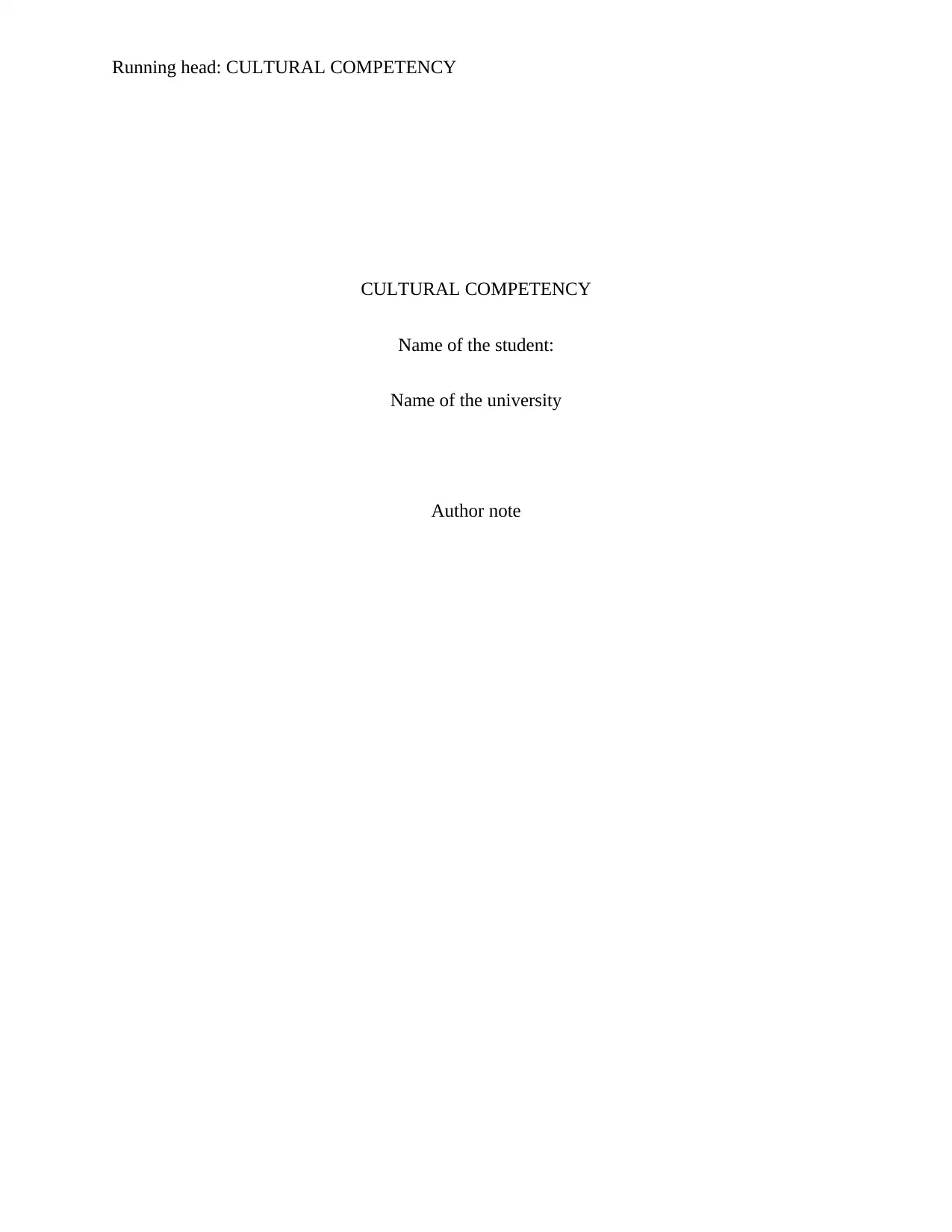
Running head: CULTURAL COMPETENCY
CULTURAL COMPETENCY
Name of the student:
Name of the university
Author note
CULTURAL COMPETENCY
Name of the student:
Name of the university
Author note
Paraphrase This Document
Need a fresh take? Get an instant paraphrase of this document with our AI Paraphraser
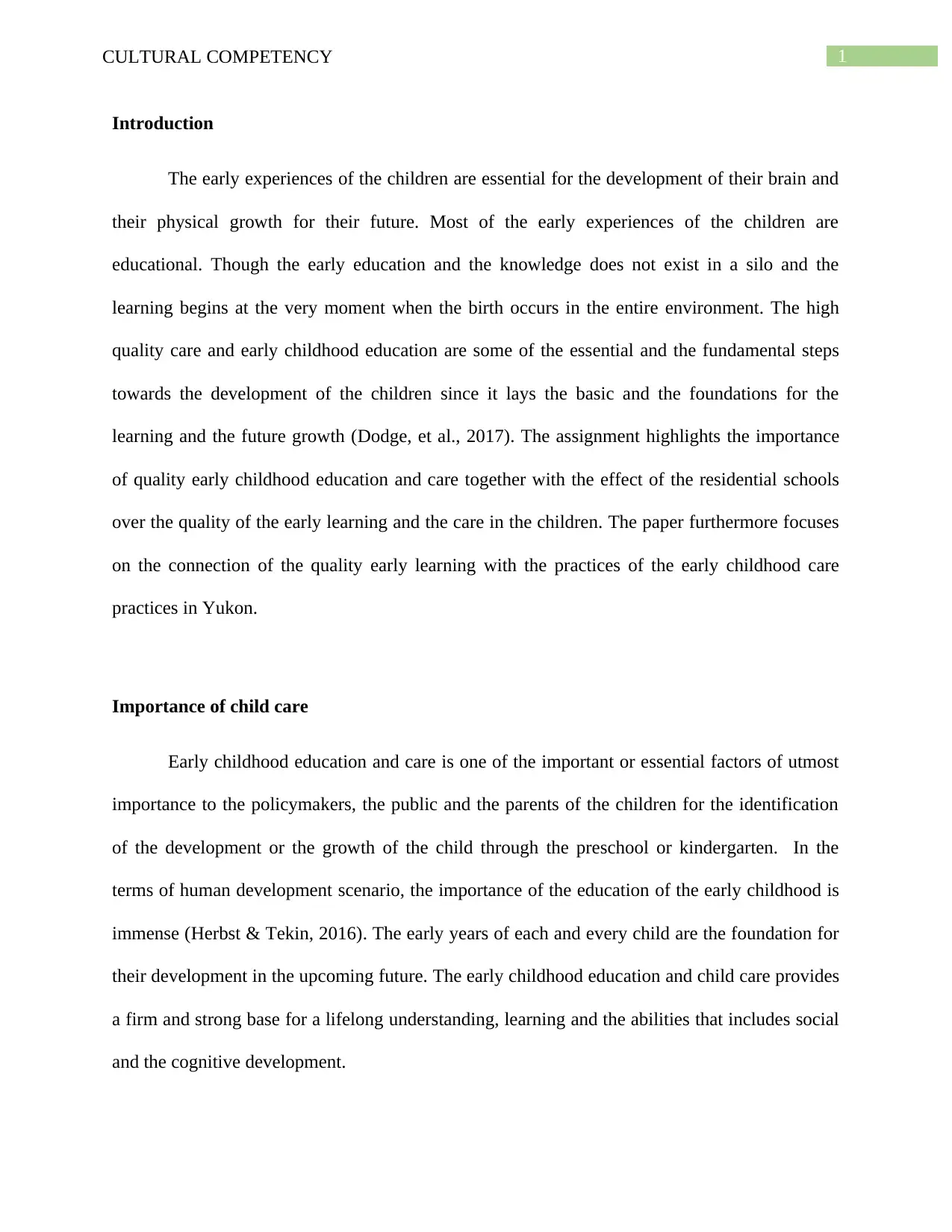
1CULTURAL COMPETENCY
Introduction
The early experiences of the children are essential for the development of their brain and
their physical growth for their future. Most of the early experiences of the children are
educational. Though the early education and the knowledge does not exist in a silo and the
learning begins at the very moment when the birth occurs in the entire environment. The high
quality care and early childhood education are some of the essential and the fundamental steps
towards the development of the children since it lays the basic and the foundations for the
learning and the future growth (Dodge, et al., 2017). The assignment highlights the importance
of quality early childhood education and care together with the effect of the residential schools
over the quality of the early learning and the care in the children. The paper furthermore focuses
on the connection of the quality early learning with the practices of the early childhood care
practices in Yukon.
Importance of child care
Early childhood education and care is one of the important or essential factors of utmost
importance to the policymakers, the public and the parents of the children for the identification
of the development or the growth of the child through the preschool or kindergarten. In the
terms of human development scenario, the importance of the education of the early childhood is
immense (Herbst & Tekin, 2016). The early years of each and every child are the foundation for
their development in the upcoming future. The early childhood education and child care provides
a firm and strong base for a lifelong understanding, learning and the abilities that includes social
and the cognitive development.
Introduction
The early experiences of the children are essential for the development of their brain and
their physical growth for their future. Most of the early experiences of the children are
educational. Though the early education and the knowledge does not exist in a silo and the
learning begins at the very moment when the birth occurs in the entire environment. The high
quality care and early childhood education are some of the essential and the fundamental steps
towards the development of the children since it lays the basic and the foundations for the
learning and the future growth (Dodge, et al., 2017). The assignment highlights the importance
of quality early childhood education and care together with the effect of the residential schools
over the quality of the early learning and the care in the children. The paper furthermore focuses
on the connection of the quality early learning with the practices of the early childhood care
practices in Yukon.
Importance of child care
Early childhood education and care is one of the important or essential factors of utmost
importance to the policymakers, the public and the parents of the children for the identification
of the development or the growth of the child through the preschool or kindergarten. In the
terms of human development scenario, the importance of the education of the early childhood is
immense (Herbst & Tekin, 2016). The early years of each and every child are the foundation for
their development in the upcoming future. The early childhood education and child care provides
a firm and strong base for a lifelong understanding, learning and the abilities that includes social
and the cognitive development.

2CULTURAL COMPETENCY
High quality of child care and early childhood education tends to have positive influence
on the development of the children’s brain and the physical development and make them ready
for the upcoming phase of life by the provision of social experiences and valuable educational
experiences (Greger et al., 2016). The importance of the high quality child care is generally
characterized as inclusion of well qualified , well paid, low child adult ratios and efficiency in
management. The social, emotional and physical development of the children in their early
stages of life furthermore tends to have direct impact on the overall development and on their
upcoming phases of life (O'malley et al., 2015). The early childhood education and child care is
thus considered essential since attending of the early educational program for the children tends
to beneficial since the child will improve her motor and the language skills while initiating
development of the learning and the cognitive skills that are furthermore necessary and important
for their growth. The quality care in the early childhood tends to have positive influence in the
learning and development of the child (Raptis, 2015). One of the economic benefits of the early
child care and educational programs is the extensive growth of the children with their enrollment
for further education, chances of high income and better health coverage.
Early child hood care in Yukon supports the children and the families in the early years
towards their growth and their development (Moss, 2017). The Early Learning and Child Care
(ELCC) in the Yukon aim to meet the requirements that are identified by the community for the
preparation of the education for the educators of the early childhood.
Benefits of residential schooling
Residential schooling offers a range of benefits to the students. Even in the case of the
early childhood school programme in Yukon, the context of residential schooling rose to be one
of the important and essential factors as the first step in the long term growth development of
High quality of child care and early childhood education tends to have positive influence
on the development of the children’s brain and the physical development and make them ready
for the upcoming phase of life by the provision of social experiences and valuable educational
experiences (Greger et al., 2016). The importance of the high quality child care is generally
characterized as inclusion of well qualified , well paid, low child adult ratios and efficiency in
management. The social, emotional and physical development of the children in their early
stages of life furthermore tends to have direct impact on the overall development and on their
upcoming phases of life (O'malley et al., 2015). The early childhood education and child care is
thus considered essential since attending of the early educational program for the children tends
to beneficial since the child will improve her motor and the language skills while initiating
development of the learning and the cognitive skills that are furthermore necessary and important
for their growth. The quality care in the early childhood tends to have positive influence in the
learning and development of the child (Raptis, 2015). One of the economic benefits of the early
child care and educational programs is the extensive growth of the children with their enrollment
for further education, chances of high income and better health coverage.
Early child hood care in Yukon supports the children and the families in the early years
towards their growth and their development (Moss, 2017). The Early Learning and Child Care
(ELCC) in the Yukon aim to meet the requirements that are identified by the community for the
preparation of the education for the educators of the early childhood.
Benefits of residential schooling
Residential schooling offers a range of benefits to the students. Even in the case of the
early childhood school programme in Yukon, the context of residential schooling rose to be one
of the important and essential factors as the first step in the long term growth development of
⊘ This is a preview!⊘
Do you want full access?
Subscribe today to unlock all pages.

Trusted by 1+ million students worldwide
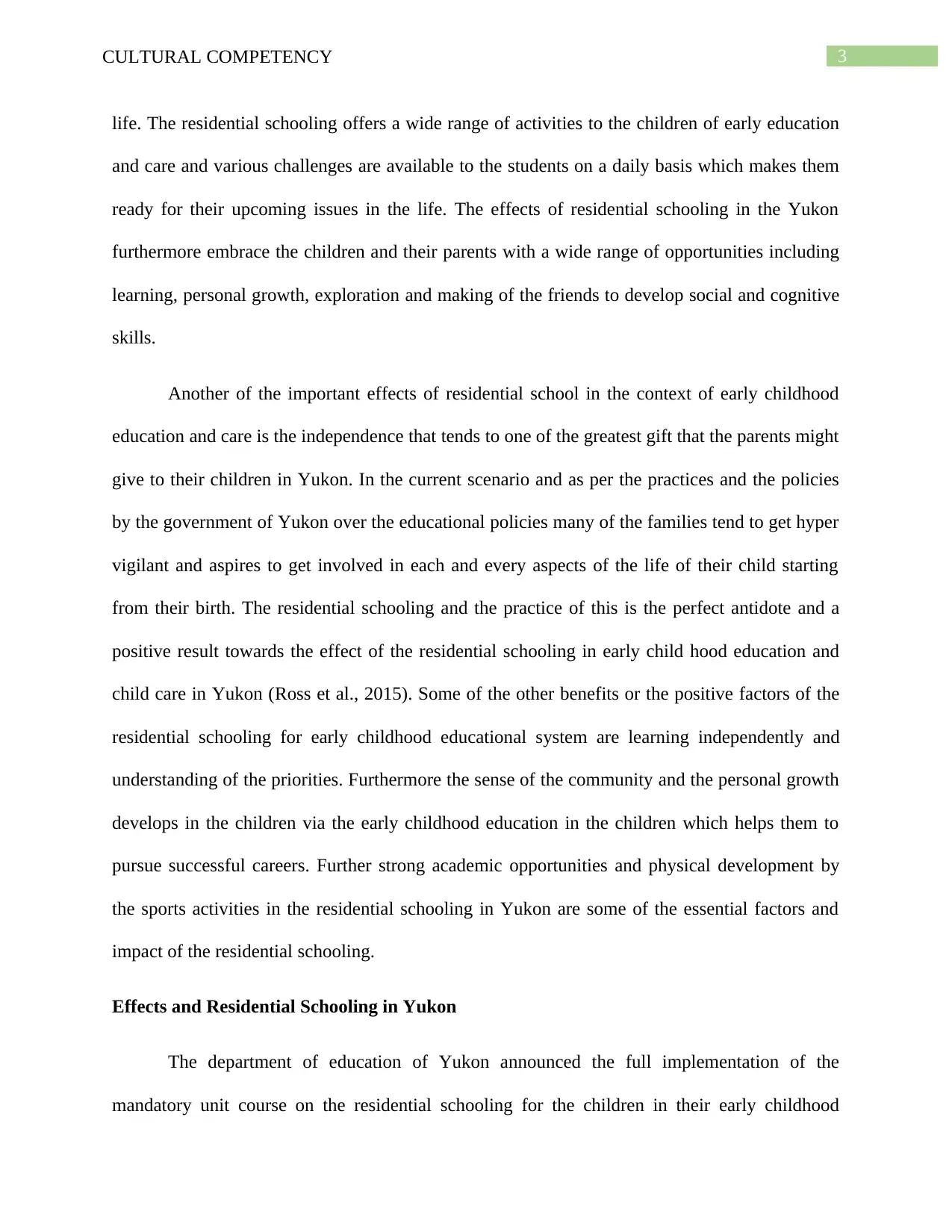
3CULTURAL COMPETENCY
life. The residential schooling offers a wide range of activities to the children of early education
and care and various challenges are available to the students on a daily basis which makes them
ready for their upcoming issues in the life. The effects of residential schooling in the Yukon
furthermore embrace the children and their parents with a wide range of opportunities including
learning, personal growth, exploration and making of the friends to develop social and cognitive
skills.
Another of the important effects of residential school in the context of early childhood
education and care is the independence that tends to one of the greatest gift that the parents might
give to their children in Yukon. In the current scenario and as per the practices and the policies
by the government of Yukon over the educational policies many of the families tend to get hyper
vigilant and aspires to get involved in each and every aspects of the life of their child starting
from their birth. The residential schooling and the practice of this is the perfect antidote and a
positive result towards the effect of the residential schooling in early child hood education and
child care in Yukon (Ross et al., 2015). Some of the other benefits or the positive factors of the
residential schooling for early childhood educational system are learning independently and
understanding of the priorities. Furthermore the sense of the community and the personal growth
develops in the children via the early childhood education in the children which helps them to
pursue successful careers. Further strong academic opportunities and physical development by
the sports activities in the residential schooling in Yukon are some of the essential factors and
impact of the residential schooling.
Effects and Residential Schooling in Yukon
The department of education of Yukon announced the full implementation of the
mandatory unit course on the residential schooling for the children in their early childhood
life. The residential schooling offers a wide range of activities to the children of early education
and care and various challenges are available to the students on a daily basis which makes them
ready for their upcoming issues in the life. The effects of residential schooling in the Yukon
furthermore embrace the children and their parents with a wide range of opportunities including
learning, personal growth, exploration and making of the friends to develop social and cognitive
skills.
Another of the important effects of residential school in the context of early childhood
education and care is the independence that tends to one of the greatest gift that the parents might
give to their children in Yukon. In the current scenario and as per the practices and the policies
by the government of Yukon over the educational policies many of the families tend to get hyper
vigilant and aspires to get involved in each and every aspects of the life of their child starting
from their birth. The residential schooling and the practice of this is the perfect antidote and a
positive result towards the effect of the residential schooling in early child hood education and
child care in Yukon (Ross et al., 2015). Some of the other benefits or the positive factors of the
residential schooling for early childhood educational system are learning independently and
understanding of the priorities. Furthermore the sense of the community and the personal growth
develops in the children via the early childhood education in the children which helps them to
pursue successful careers. Further strong academic opportunities and physical development by
the sports activities in the residential schooling in Yukon are some of the essential factors and
impact of the residential schooling.
Effects and Residential Schooling in Yukon
The department of education of Yukon announced the full implementation of the
mandatory unit course on the residential schooling for the children in their early childhood
Paraphrase This Document
Need a fresh take? Get an instant paraphrase of this document with our AI Paraphraser

4CULTURAL COMPETENCY
educational practices with the target or the goal to provide awareness regarding the importance
of education and early childhood care together with the understanding among the families in the
rural region of Yukon. This was initiated since most of the families were not aware of the
importance of the education and the residential schooling where they have to go through proper
discipline (Black et al., 2017). The changes initiated by the government of Yukon aimed towards
the educational practices that needs to be changed or transformed for a positive tool for the
change and make every one aware regarding that the educational and the practice is not limited
to non indigenous population in Yukon (Berger, Johnston & Oskineegish, 2016).
The introduction and the practice of residential schooling envisioned as one of the driving
force towards the awareness for the change in educational system of the country (Eble & Hu,
2016). Some of the essential impacts of the residential schooling in the country are exciting
opportunities and experiences, rich history of the residential schooling, the cultural diversity and
access to the pastoral care (Wilk, Maltby & Cooke, 2017). In the residential school of the
country, the children gets the culture of the pastoral culture, the positive peering and the care by
the early child hood care giver and advisor. Under the care of the residential educational stuffs,
the children gets the access of range qualified teaching staff out of the school hours and their
care in their early childhood days.
High quality early childhood education and care has been long associated with the
improved education, social outcomes and the residential schooling practices in the Yukon which
furthermore enables better chances to the children (Riina, Lippert & Brooks‐Gunn, 2016). The
provisions of the residential schools not only provide quality educational support and care to the
children but its effect is also extended to the children and their families. The provision of the
educational practices with the target or the goal to provide awareness regarding the importance
of education and early childhood care together with the understanding among the families in the
rural region of Yukon. This was initiated since most of the families were not aware of the
importance of the education and the residential schooling where they have to go through proper
discipline (Black et al., 2017). The changes initiated by the government of Yukon aimed towards
the educational practices that needs to be changed or transformed for a positive tool for the
change and make every one aware regarding that the educational and the practice is not limited
to non indigenous population in Yukon (Berger, Johnston & Oskineegish, 2016).
The introduction and the practice of residential schooling envisioned as one of the driving
force towards the awareness for the change in educational system of the country (Eble & Hu,
2016). Some of the essential impacts of the residential schooling in the country are exciting
opportunities and experiences, rich history of the residential schooling, the cultural diversity and
access to the pastoral care (Wilk, Maltby & Cooke, 2017). In the residential school of the
country, the children gets the culture of the pastoral culture, the positive peering and the care by
the early child hood care giver and advisor. Under the care of the residential educational stuffs,
the children gets the access of range qualified teaching staff out of the school hours and their
care in their early childhood days.
High quality early childhood education and care has been long associated with the
improved education, social outcomes and the residential schooling practices in the Yukon which
furthermore enables better chances to the children (Riina, Lippert & Brooks‐Gunn, 2016). The
provisions of the residential schools not only provide quality educational support and care to the
children but its effect is also extended to the children and their families. The provision of the

5CULTURAL COMPETENCY
residential schools enables the single parent to participate in the labor market without any
tension regarding their children and their early years knowledge
Conclusion
Early childhood education and childhood care has been one of the growing priority in
many of the countries. The early years of each and every child are the foundation for their
development in the upcoming future. The residential schooling offers a wide range of activities
to the children of early education and care and various challenges are available to the students on
a daily basis which makes them ready for their upcoming issues in the life. The assignment
focuses on the importance of quality early childhood education and care together with the effect
of the residential schools over the quality of the early learning and the care in the children in
Yukon.
residential schools enables the single parent to participate in the labor market without any
tension regarding their children and their early years knowledge
Conclusion
Early childhood education and childhood care has been one of the growing priority in
many of the countries. The early years of each and every child are the foundation for their
development in the upcoming future. The residential schooling offers a wide range of activities
to the children of early education and care and various challenges are available to the students on
a daily basis which makes them ready for their upcoming issues in the life. The assignment
focuses on the importance of quality early childhood education and care together with the effect
of the residential schools over the quality of the early learning and the care in the children in
Yukon.
⊘ This is a preview!⊘
Do you want full access?
Subscribe today to unlock all pages.

Trusted by 1+ million students worldwide
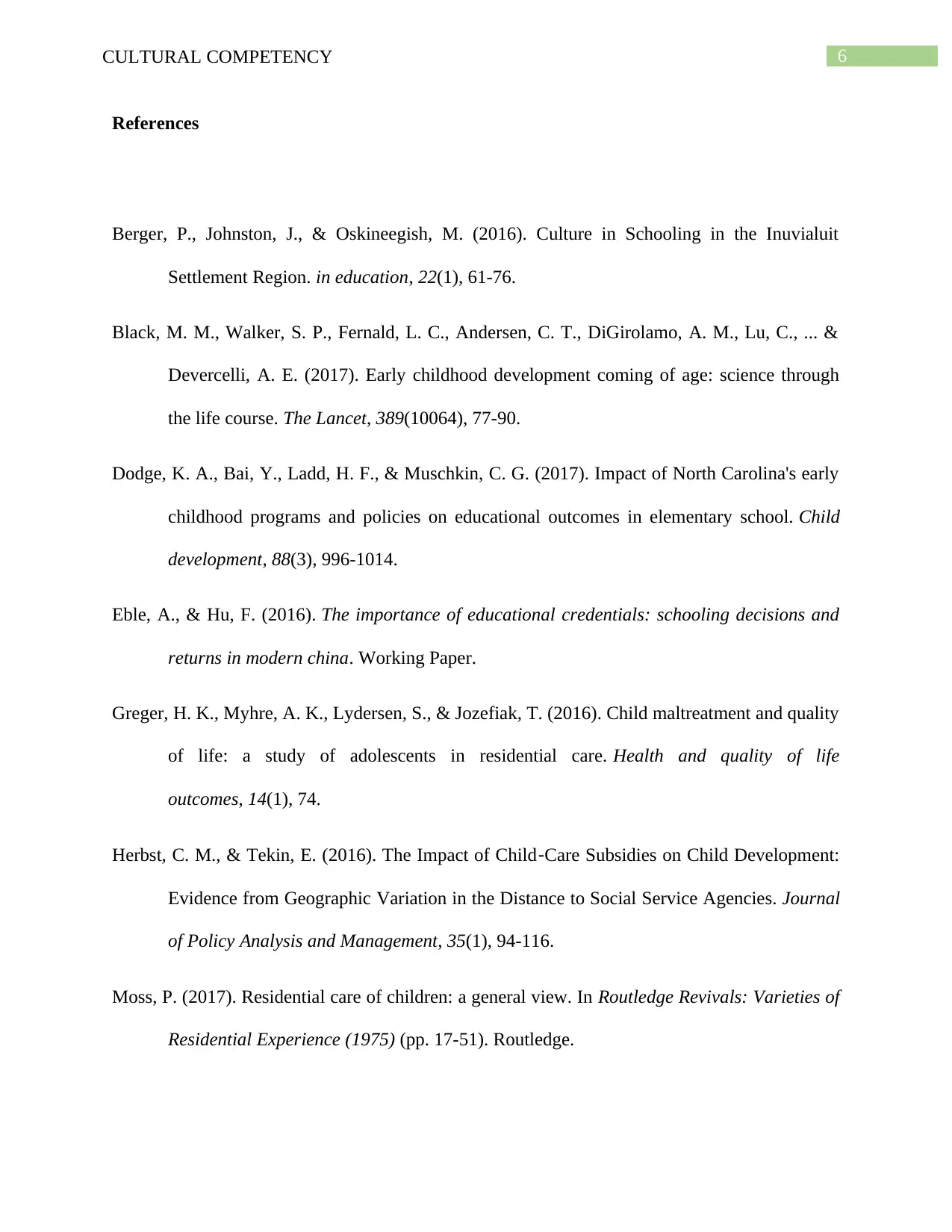
6CULTURAL COMPETENCY
References
Berger, P., Johnston, J., & Oskineegish, M. (2016). Culture in Schooling in the Inuvialuit
Settlement Region. in education, 22(1), 61-76.
Black, M. M., Walker, S. P., Fernald, L. C., Andersen, C. T., DiGirolamo, A. M., Lu, C., ... &
Devercelli, A. E. (2017). Early childhood development coming of age: science through
the life course. The Lancet, 389(10064), 77-90.
Dodge, K. A., Bai, Y., Ladd, H. F., & Muschkin, C. G. (2017). Impact of North Carolina's early
childhood programs and policies on educational outcomes in elementary school. Child
development, 88(3), 996-1014.
Eble, A., & Hu, F. (2016). The importance of educational credentials: schooling decisions and
returns in modern china. Working Paper.
Greger, H. K., Myhre, A. K., Lydersen, S., & Jozefiak, T. (2016). Child maltreatment and quality
of life: a study of adolescents in residential care. Health and quality of life
outcomes, 14(1), 74.
Herbst, C. M., & Tekin, E. (2016). The Impact of Child‐Care Subsidies on Child Development:
Evidence from Geographic Variation in the Distance to Social Service Agencies. Journal
of Policy Analysis and Management, 35(1), 94-116.
Moss, P. (2017). Residential care of children: a general view. In Routledge Revivals: Varieties of
Residential Experience (1975) (pp. 17-51). Routledge.
References
Berger, P., Johnston, J., & Oskineegish, M. (2016). Culture in Schooling in the Inuvialuit
Settlement Region. in education, 22(1), 61-76.
Black, M. M., Walker, S. P., Fernald, L. C., Andersen, C. T., DiGirolamo, A. M., Lu, C., ... &
Devercelli, A. E. (2017). Early childhood development coming of age: science through
the life course. The Lancet, 389(10064), 77-90.
Dodge, K. A., Bai, Y., Ladd, H. F., & Muschkin, C. G. (2017). Impact of North Carolina's early
childhood programs and policies on educational outcomes in elementary school. Child
development, 88(3), 996-1014.
Eble, A., & Hu, F. (2016). The importance of educational credentials: schooling decisions and
returns in modern china. Working Paper.
Greger, H. K., Myhre, A. K., Lydersen, S., & Jozefiak, T. (2016). Child maltreatment and quality
of life: a study of adolescents in residential care. Health and quality of life
outcomes, 14(1), 74.
Herbst, C. M., & Tekin, E. (2016). The Impact of Child‐Care Subsidies on Child Development:
Evidence from Geographic Variation in the Distance to Social Service Agencies. Journal
of Policy Analysis and Management, 35(1), 94-116.
Moss, P. (2017). Residential care of children: a general view. In Routledge Revivals: Varieties of
Residential Experience (1975) (pp. 17-51). Routledge.
Paraphrase This Document
Need a fresh take? Get an instant paraphrase of this document with our AI Paraphraser
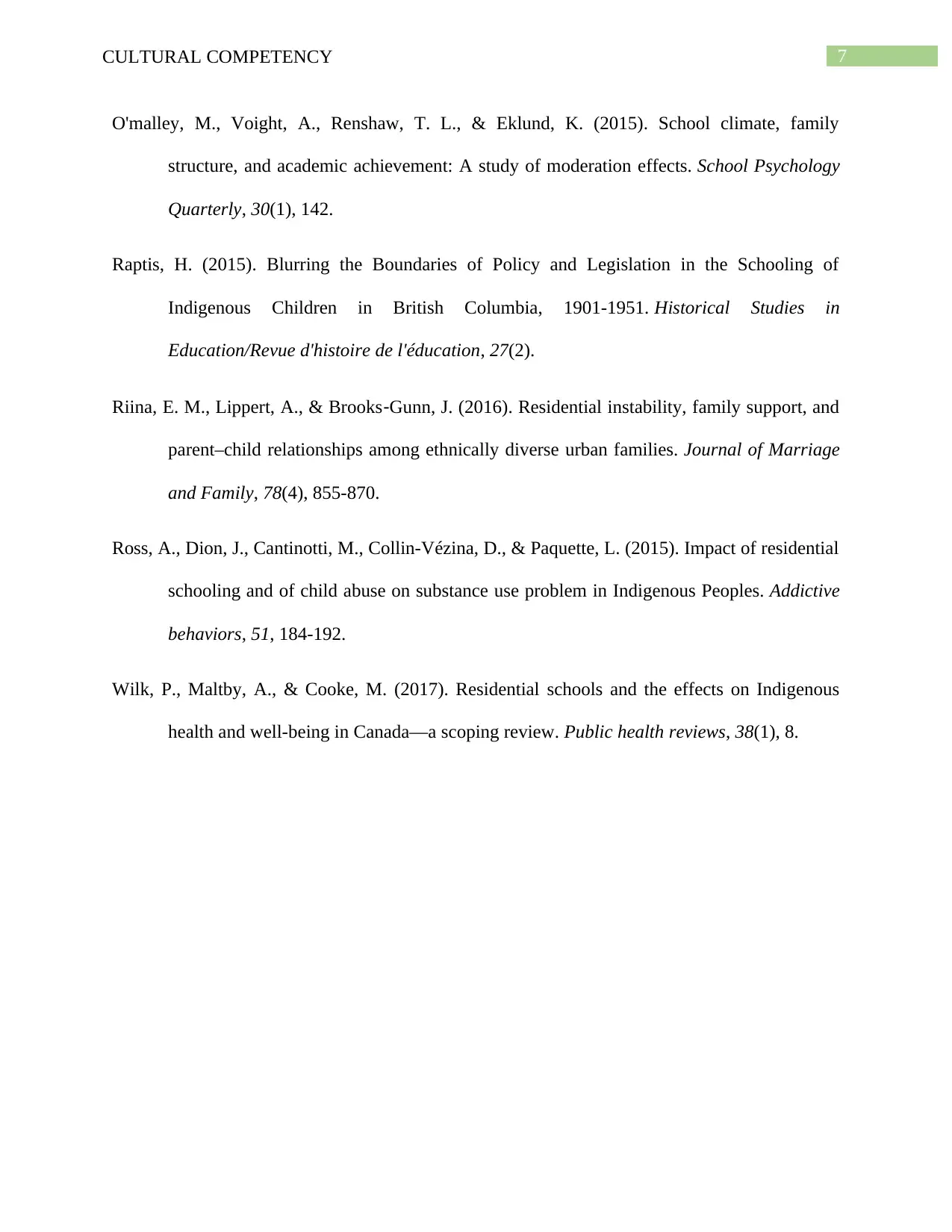
7CULTURAL COMPETENCY
O'malley, M., Voight, A., Renshaw, T. L., & Eklund, K. (2015). School climate, family
structure, and academic achievement: A study of moderation effects. School Psychology
Quarterly, 30(1), 142.
Raptis, H. (2015). Blurring the Boundaries of Policy and Legislation in the Schooling of
Indigenous Children in British Columbia, 1901-1951. Historical Studies in
Education/Revue d'histoire de l'éducation, 27(2).
Riina, E. M., Lippert, A., & Brooks‐Gunn, J. (2016). Residential instability, family support, and
parent–child relationships among ethnically diverse urban families. Journal of Marriage
and Family, 78(4), 855-870.
Ross, A., Dion, J., Cantinotti, M., Collin-Vézina, D., & Paquette, L. (2015). Impact of residential
schooling and of child abuse on substance use problem in Indigenous Peoples. Addictive
behaviors, 51, 184-192.
Wilk, P., Maltby, A., & Cooke, M. (2017). Residential schools and the effects on Indigenous
health and well-being in Canada—a scoping review. Public health reviews, 38(1), 8.
O'malley, M., Voight, A., Renshaw, T. L., & Eklund, K. (2015). School climate, family
structure, and academic achievement: A study of moderation effects. School Psychology
Quarterly, 30(1), 142.
Raptis, H. (2015). Blurring the Boundaries of Policy and Legislation in the Schooling of
Indigenous Children in British Columbia, 1901-1951. Historical Studies in
Education/Revue d'histoire de l'éducation, 27(2).
Riina, E. M., Lippert, A., & Brooks‐Gunn, J. (2016). Residential instability, family support, and
parent–child relationships among ethnically diverse urban families. Journal of Marriage
and Family, 78(4), 855-870.
Ross, A., Dion, J., Cantinotti, M., Collin-Vézina, D., & Paquette, L. (2015). Impact of residential
schooling and of child abuse on substance use problem in Indigenous Peoples. Addictive
behaviors, 51, 184-192.
Wilk, P., Maltby, A., & Cooke, M. (2017). Residential schools and the effects on Indigenous
health and well-being in Canada—a scoping review. Public health reviews, 38(1), 8.
1 out of 8
Related Documents
Your All-in-One AI-Powered Toolkit for Academic Success.
+13062052269
info@desklib.com
Available 24*7 on WhatsApp / Email
![[object Object]](/_next/static/media/star-bottom.7253800d.svg)
Unlock your academic potential
Copyright © 2020–2026 A2Z Services. All Rights Reserved. Developed and managed by ZUCOL.



